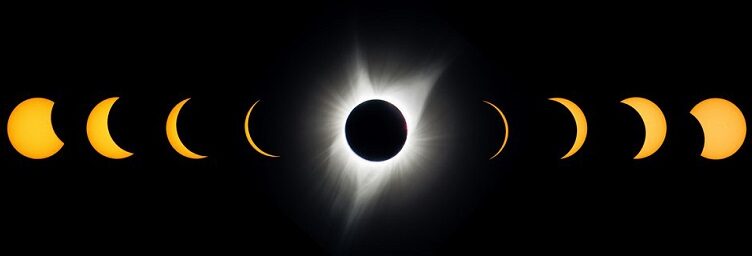Eclipses have fascinated humanity throughout history, inspiring awe and sometimes fear. Across various cultures, these celestial events have been interpreted in myriad ways, often reflecting the beliefs and knowledge of the time. This blog explores how different ancient civilizations understood eclipses and the enduring impact of these interpretations on culture and mythology.
Ancient Civilizations’ Interpretations
Ancient Egypt
In Ancient Egypt, the solar eclipse was thought to be the result of the sun god Ra being swallowed by the sky goddess Nut. This dramatic event was not just a spectacle; it was seen as a moment of cosmic rebalance, necessitating rituals to ensure the god’s rebirth and the continuity of life on Earth.
Ancient China
For the Ancient Chinese, an eclipse was an omen of the emperor’s fitness to rule. They believed a celestial dragon was consuming the sun, prompting the imperial court to perform public rituals and ceremonies to chase away the dragon and restore harmony.
Ancient Greece and Rome
The Greeks and Romans, known for their philosophical approach to natural phenomena, sought explanations rooted in science rather than myth. They speculated about the celestial mechanics behind eclipses, yet the events still held significant symbolic weight in literature and public discourse, reflecting societal concerns about fate and destiny.
Mythologies Surrounding Eclipses
Eclipse mythologies often feature common themes of conflict and resolution, such as celestial battles or divine punishments. These stories were not just entertaining; they served as explanations for the unexplainable and reassured the populace by imposing a narrative structure on a frightening event.
Eclipse Rituals and Observations
Eclipse rituals varied widely. In many cultures, people would gather to bang pots, shout, or play loud music to scare away whatever beast was believed to be threatening the sun or moon. These communal activities strengthened social bonds and reinforced the cultural framework that gave the events meaning.
Influence on Cultural Beliefs and Practices
Eclipses have profoundly influenced cultural practices and belief systems, often symbolizing the potential for renewal or change. For instance, they have marked significant events in calendars and have been used to predict the outcomes of battles or the fate of kings.
Documentation
The importance of documenting historical eclipse observations and rituals cannot be overstated. These records provide insight into the scientific and cultural evolution of societies. With modern technology, the service for transferring videos becomes crucial in preserving this valuable historical footage, allowing future generations to witness and study these fascinating moments.
Recommendation for Modern Observations
For those interested in capturing the magic of modern eclipse events and cultural celebrations, it is advisable to use top-rated camcorders. These devices offer superior video quality, ensuring that every detail of these captivating phenomena is preserved for posterity.
Conclusion
Eclipses continue to captivate us, bridging the gap between the ancient and the modern, the scientific and the mystical. They remind us of our perpetual quest for understanding and the beautiful ways in which our ancestors sought to explain the cosmos. By documenting these events, whether through ancient texts or modern video capture, we keep the legacy of human curiosity and cultural richness alive. For capturing these moments, consider using the best tools available to ensure that every eclipse is recorded with the clarity and detail it deserves.

